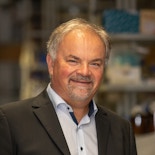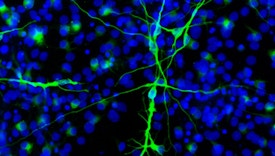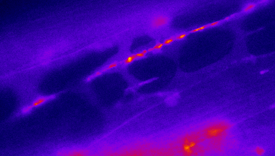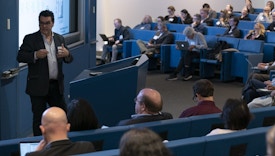
Jürgen Knoblich, Ph.D.
Scientific Director, Institute of Molecular Biotechnology of the Austrian Academy of Sciences
SFARI Investigator WebsiteJürgen Knoblich started his scientific career as a graduate student at the Max Planck Institute in Tübingen, where he worked on cell cycle control in Drosophila under the guidance of Christian Lehner. In 1994, Knoblich moved to San Francisco to join the laboratory of Yuh Nung and Lily Jan where he discovered his interest in asymmetric cell division, a topic that has remained the main focus of his research ever since. In 1997, Knoblich returned to Europe to become a group leader at the Institute of Molecular Pathology in Vienna, Austria. In 2004, he moved next door to the newly founded Institute of Molecular Biotechnology of the Austrian Academy of Sciences. He became a senior scientist and was appointed deputy director of the institute in 2005 and director in 2018.
Knoblich’s laboratory is interested in the biology of neural stem cells. In the fruit fly, they have identified the molecular mechanism that allows neural stem cells to segregate protein determinants into only one daughter cell during mitosis and to divide asymmetrically. They have demonstrated that defects in this mechanism lead to brain tumor formation.
More recently, they have extended their interest to analyzing mammalian neural progenitors and their contribution to brain development. To analyze those processes in humans, they have established a 3-D culture system that recapitulates the early steps of human brain development in vitro, allowing brain pathologies and human specific developmental events to be studied in unprecedented detail. In particular, they have used this system for modelling microcephaly, thereby demonstrating for the first time that human neurodevelopmental disorders can be studied in 3-D culture.
Knoblich has received several awards, including the Sir Hans Krebs Medal (2015), the Erwin Schrödinger Prize (2012), the Wittgenstein Award (2009) and the Anniversary Award of the Federation of European Biochemical (FEBS) (2001). He is a member of the European Molecular Biology Organization (EMBO), the Austrian Academy of Sciences and the Pontifical Academy of Sciences. He serves on the EMBO council and the International Society for Stem Cell Research (ISSCR) Board of Directors.


